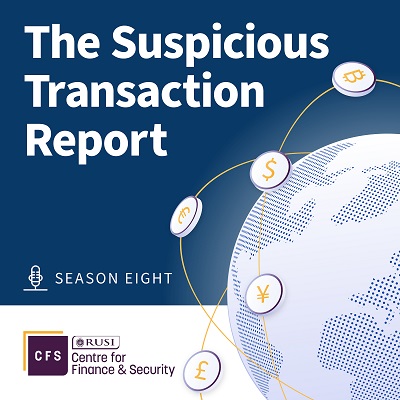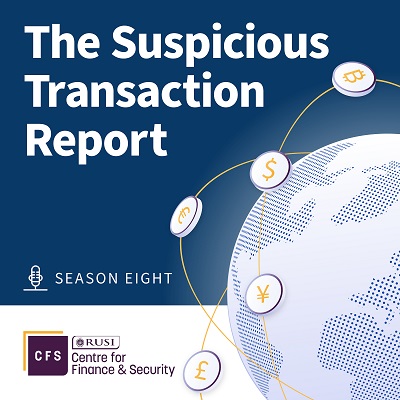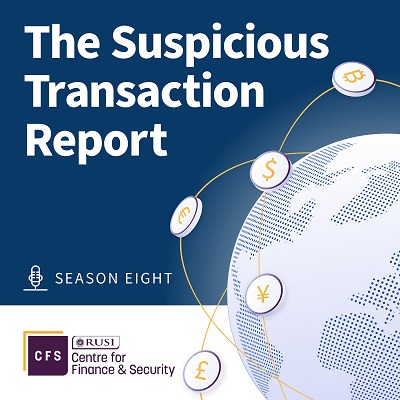Discover STR: Suspicious Transaction Report
STR: Suspicious Transaction Report

STR: Suspicious Transaction Report
Author: Royal United Services Institute
Subscribed: 162Played: 3,738Subscribe
Share
Description
From the team analysing the intersection of finance and security, tune into compelling conversations on the real-world impact of global illicit finance.
This podcast explores the financial dimensions of today’s leading transnational security challenges. Host Tom Keatinge and the team from the Centre for Finance and Security at RUSI bring you unique insights on the challenges posed by illicit finance and practical analysis of the policy responses. They interview top thinkers and influential voices who unpack the complex world of money laundering, corruption, sanctions evasion and illicit flows, and explain how this shapes the evolving global security landscape, and what democracies and international institutions must do to stay ahead when it comes to the financial dimensions of the global threat outlook.
Suspicious Transaction Report is also home to CFS's 'Financial Crime Insights' podcast, which ran from 2020 to 2023.
This podcast explores the financial dimensions of today’s leading transnational security challenges. Host Tom Keatinge and the team from the Centre for Finance and Security at RUSI bring you unique insights on the challenges posed by illicit finance and practical analysis of the policy responses. They interview top thinkers and influential voices who unpack the complex world of money laundering, corruption, sanctions evasion and illicit flows, and explain how this shapes the evolving global security landscape, and what democracies and international institutions must do to stay ahead when it comes to the financial dimensions of the global threat outlook.
Suspicious Transaction Report is also home to CFS's 'Financial Crime Insights' podcast, which ran from 2020 to 2023.
117 Episodes
Reverse
Kimberly Donovan joins Kinga Redlowska to discuss the evolving role of economic security and economic statecraft in global affairs. Kimberly Donovan, Director of the Economic Statecraft Initiative at the Atlantic Council, talks to host Kinga Redlowska about the important differences between economic security and economic statecraft, the value of ‘positive economic statecraft’ and Global South engagement, the ‘axis of evasion’, and much more besides.
The effective use of sanctions needs clear objectives and outcomes, multilateral coordination, and rigorous enforcement; their overuse can have unintended consequences. Former US Deputy Treasury Secretary Wally Adeyemo talks to host Tom Keatinge about the 2021 US Treasury Sanctions Review, the use of sanctions following Russia's full-scale invasion of Ukraine and the challenges posed by cryptocurrencies in designing sanctions in response to Hamas's murderous attack on Israel. He stresses that sanctions must be tied to measurable goals, integrated into broader foreign policy, and enforced via multilateral cooperation to remain credible. But he also warns that overuse risks undermining US influence by pushing adversaries toward alternative financial systems and causing unintended humanitarian harm.
A personal story exploring the challenges of introducing financial integrity and transparency to Myanmar's financial system - and of 650 days of imprisonment as a result. We talk a lot about the realities of fighting financial crime and the harms that these crimes cause. But what happens when the victims are the financial crime fighter or the financial reformer themselves...? In this first episode of Season 8, CFS Director Tom Keatinge speaks with Sean Turnell, an Australian economist and central banker, about his attempts to reform Myanmar's dysfunctional banking system after Aung San Suu Kyi's election victory in 2015, the opposition he faced from the cronies and military leaders who benefited from the status quo, and his subsequent imprisonment following the 2021 coup.
Host Tom Keatinge reveals what's in store for Season 8 of the Suspicious Transaction Report. Some great episodes are already lined up, delving into terrorist financing, what it's like to be imprisoned after attempting to reform a country's financial system, how to lead not one, not two, but three financial intelligence units (FIUs), and why the best way to fight financial crime is time in a prison cell with a guy called Bruno... There's so much more to come.
Kinga Redlowska and Tom Keatinge reflect on the latest season, the CFS's 10th anniversary and the future of finance and security work. In this special season-wrap episode of the Suspicious Transaction Report podcast, host Kinga Redlowska, Head of Centre for Finance and Security (CFS) at RUSI Europe, is joined by Director Tom Keatinge to look back on a defining year. Together, they revisit highlights from the past 21 episodes, exploring major themes that emerged – from sanctions and statecraft to assessing the new Labour government's progress against the illicit finance. They look back on the highlights of the season – memorable episodes, key moments like the FinSec25 conference, and a global journey that took the team from London and Brussels to Romania, Armenia, and beyond. The conversation also looks ahead, as CFS continues to adapt to shifting threats from illicit finance and hostile state actors. With thoughtful reflection and an eye toward the future, Kinga and Tom wrap up Season 7 by asking: What lies ahead at the intersection of finance and security?
After 12 months in office, has the new Labour government turned the page on the fight against illicit finance, or is governing harder than opposition? CFS Director Tom Keatinge speaks with CFS Financial Crime Policy lead Kathryn Westmore and Associate Fellow Josie Stewart about the progress made by the new Labour government in its efforts to combat illicit finance as they assess what more should be done based on Josie's recently published Policy Brief.
A look behind the curtain at the financial dimension of Russia’s attempts to undermine Moldova’s 2024 presidential election and EU referendum. CFS Director Tom Keatinge speaks with Veronica Dragalin, former Chief Anti-Corruption Prosecutor in Moldova, who had a front row seat as the country confronted the reality of Russia’s attempts to subvert the 2024 presidential election and EU referendum via large scale illicit money flows into the country.
How the compliance systems of financial institutions have adapted in response to post-2022 trade restrictions on Russia. CFS Director Tom Keatinge speaks with CFS Associate Fellow Olivia Allison and Jinesh Amin, a financial crime specialist at Quantexa. They discuss the latest CFS policy brief co-authored by Olivia which looks at how banks have responded to the ever-mounting expectations placed on them by governments in their effort to restrict the funding, and importantly resourcing, of the Russian military.
Sanctions have become the go-to policy tool of our times, yet the lessons of the past are often forgotten by those at the centre of the world's stage today. CFS Director Tom Keatinge speaks with Eddie Fishman, a former US State Department sanctions official, about his new book ‘Chokepoints.’ Eddie gives a behind the scenes account of how the power of the US dollar and US-dominated financial and trade systems have been harnessed to support the projection of US foreign policy, and what lessons this 25-year episode of history holds for today’s policymakers.
A new report from the Financial Action Task Force examines how financial intelligence can be used to protect children from online sexual exploitation. CFS Director Tom Keatinge speaks with Abi Harrison from the United Kingdom's HM Treasury and Stefan Jerga from the Australian Federal Police about a new report from the Financial Action Task Force, examining the financial dimension of online child sexual exploitation. The report, which they co-led, highlights the alarming growth of this horrific crime and the financial indicators which can be used to detect, disrupt and investigate perpetrators and safeguard victims.
With geopolitical risk rising, this episode examines a recent Dutch National Bank report on how banks should navigate growing global tensions and fragmentation. CFS Director Tom Keatinge speaks with Thomas Vos, Strategy & Policy Advisor of De Nederlandsche Bank and Haroon Sheikh, Senior Research Fellow at the Netherlands Scientific Council for Government Policy (WRR) on the risks posed to the banking sector by growing geopolitical risk and fragmentation, their impact on society, and how the financial community should respond.
How could frozen Russian assets be used and what are the legal and geopolitical implications? Head of CFS Europe, Kinga Redlowska, is joined by Anton Moiseienko, CFS Associate Fellow and Senior Lecturer in Law at the Australian National University, along with Tom Keatinge, Director of CFS. They explore the ongoing debate about the future of frozen Russian assets, examining their potential uses and the legal, political and economic consequences for EU sanctions policy and international law.
This episode explores the role of the Financial Intelligence Unit (FIU)-the Netherlands in combating financial crime, featuring insights from its head, Hennie Verbeek-Kusters on challenges, strategies and global cooperation. CFS Director Tom Keatinge speaks with Hennie Verbeek-Kusters, Head of FIU-the Netherlands and former Chair of the Egmont Group, to discuss work at the FIU since 2008. They explore how FIU-the Netherlands operates, some of the unique features of the Dutch approach to fighting financial crime, the evolving financial crime landscape and the impact of international collaboration.
Sanctions on Belarus cover multiple issues: fraudulent elections, human rights abuses, and complicity in Russia's military aggression against Ukraine. But what is their real impact? Head of CFS Europe Kinga Redlowska is joined by Lev Lvovskiy, Senior Researcher at the Belarusian Economic Research and Outreach Center (BEROC) , and Tom Keatinge, Director of CFS, to examine the goals and effectiveness of sanctions on Belarus. The discussion covers economic impact, the Belarus–Russia alignment on sanctions evasion, and key challenges in sanctions enforcement.
Tom Keatinge and Jessica Davis explore the impact of Trump’s tariff threats on Canada, alongside the country’s ongoing challenges with illicit finance and money laundering. CFS Director Tom Keatinge is joined by Jessica Davis, CFS Associate Fellow and President and Principal Consultant with Insight Threat Intelligence, to discuss the rationale and impact of the threat of tariffs from the new US administration, and the policy window this might open for wider illicit finance reforms in Canada.
This episode explores the potential of whistleblower reward programmes to transform economic crime investigations. CFS Director Tom Keatinge is joined by Eliza Lockhart, Research Fellow at CFS, and Nick Ephgrave, Director of the Serious Fraud Office, to discuss Eliza’s SOC ACE research paper, ‘The Role of Financial Rewards for Whistleblowers in the Fight Against Economic Crime’. Together, they examine how financial incentives could empower whistleblowers, tackle economic crime and drive cultural and systemic change in the UK. Read the full paper
Talk of state threats, hostile states and hybrid warfare has notably increased. But how do these threats differ from those faced in the past? CFS Director Tom Keatinge is joined by Matthew Redhead, Senior Associate Fellow at CFS, to discuss his new Serious Organised Crime and Anti-Corruption Evidence (SOC ACE) research programme paper, ‘Old Wine, New Bottles: The Challenge of State Threats’, and to explore this increasingly prevalent phenomenon. Read the report here: https://rusi.org/explore-our-research/publications/external-publications/old-wine-new-bottles-challenge-state-threats
We explore the growing threat of sabotage attacks across Europe and the technological tools used for financing and recruitment. Host Tom Keatinge is joined by Dr Daniela Richterova, Senior Lecturer and Associate Professor at the Department of War Studies at King’s College London, and Holger Roonemaa and Inga Springe, investigative journalists from the Baltic states, to discuss Russia’s growing campaign of sabotage. For further reading, see Holger and Inga’s reporting here and Daniela’s co-authored article for the RUSI Journal on the sabotage gig economy here.
This episode explores the astonishing case of one of the world’s biggest money-laundering schemes via the well-known Swedish Bank, Swedbank. Host Tom Keatinge, CFS Director, and investigative reporter Axel Gordh Humlesjö examine the Swedbank story, what led to the investigation and how, even if banks have robust compliance systems that safeguard them against criminal misuse, they remain vulnerable to those with malign intent.
How might a second Trump term reshape the US’s use of sanctions? Host Kinga Redlowska, CFS Director Tom Keatinge and sanctions expert Jeff Lord examine the potential impact of a second Trump term on Russia, and how Europe should respond. With the rise of China and changing global dynamics, the conversation considers whether Trump’s trademark ‘maximum pressure’ tactics will resurface – or if he’ll veer towards a novel and more unpredictable strategy.








This an interesting topic. Having paid attention 10 years ago to the kind of 'proactive policing' described by Trevor Aaronson, the controversy around Human Terrain Mapping, and the psychographic techniques of Alexander Nix deployed in Trinidad, I have a broader set of questions about whats going on here...
I was asking this question years ago. When you catch up I might listen. until then, keep larping.
"Say no to disinfo". I wonder if you really are as stupid as that makes you sound. I'm certainly not as stupid as you obviously think I am. To think these people actually get paid...
'd-commerce' will be a thing. Platforms like Particl Marketplace will end eBay. THETA streaming will end YouTube. These big tech names we're familiar with today will go the same way the high street did. The implications are massive. Its possible to imagine the merging of social and smart contracts, without centralised control...
RUSI raising the profile of this vital area to everyday life. Nice to see cash being cited as still important for money laundering. Also the real harm caused by money launderers and professional enablers. Child exploitation and life savings are at stake. Predictions include Economic Crime Plan at risk, Brexit creates ML risk, Trust & Company service providers and Accountancy firms being investigated.
Mischa Glenny makes an excellent point about raising public concern through broadcast media. Next time you watch ANY crime drama look for the moment when the financial investigation solves the crime. This should be celebrated more often.